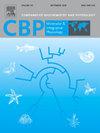Effects of acute exposure to freshwater acidification on developing Oryzias latipes
IF 2.1
3区 生物学
Q4 BIOCHEMISTRY & MOLECULAR BIOLOGY
Comparative Biochemistry and Physiology A-Molecular & Integrative Physiology
Pub Date : 2024-11-12
DOI:10.1016/j.cbpa.2024.111774
引用次数: 0
Abstract
Elevated CO2 in aquatic environments causes weak acidification. When exposed to weak acidification, regardless of life stage, most fishes undergo some degree of hypercapnia (elevation of CO2 in the bloodstream). Hypercapnia negatively affects physiological processes and embryo and larval fish are particularly vulnerable to rises in CO2. The aim of our study was to understand if weak acidification induced by elevated CO2 alters the physiology and behaviour of freshwater Japanese medaka (Oryzias latipes) embryos and larvae. To test this, we treated Japanese medaka embryos and larvae for 24 h with varying levels of weak acidification (pH 7.1 [∼482 μatm], 6.4 [∼2,122 μatm], 6.1 [∼3,280 μatm], 5.8 [∼5,306 μatm], and 5.7 [∼10,130 μatm]) at two developmental stages (72 hpf and 9 dpf). Following the treatment, heart rate, burst activity (movement within the egg), and survival of embryos were quantified. Swimming activity of hatched larvae was also measured. We observed a statistically significant 2-fold decline in heart rate of embryonic Japanese medaka as pH decreased (P < 0.01). We also found that survival of embryos significantly declined as acidification increased (P < 0.01). Behaviour of larval fish was significantly altered (P < 0.001) but not in a pH dependent manner. Our study suggests that weak acidification can cause negative effects to early life stage physiology and that behaviour can be altered. Our results suggest that if fish develop in weakly acidified freshwater there may be unfavourable impacts, including mortality at the most extreme levels.

急性暴露于淡水酸化对发育中的黄颡鱼的影响。
水生环境中的二氧化碳升高会导致弱酸化。暴露在弱酸化环境中时,无论处于哪个生命阶段,大多数鱼类都会出现某种程度的高碳酸血症(血液中二氧化碳浓度升高)。高碳酸血症会对生理过程产生负面影响,胚胎和幼鱼尤其容易受到二氧化碳升高的影响。我们的研究旨在了解二氧化碳升高引起的弱酸化是否会改变淡水日本鳉胚胎和幼鱼的生理和行为。为此,我们在两个发育阶段(72 hpf 和 9 dpf)用不同程度的弱酸化(pH 7.1 [~482 μatm]、6.4 [~2122 μatm]、6.1 [~3280 μatm]、5.8 [~5306 μatm]和 5.7 [~10,130 μatm])处理日本鳉胚胎和幼体 24 小时。处理后,对胚胎的心率、爆发活动(卵内运动)和存活率进行了量化。还测量了孵化幼虫的游泳活动。我们观察到,随着 pH 值的降低,胚胎日本鳉的心率下降了 2 倍(P
本文章由计算机程序翻译,如有差异,请以英文原文为准。
求助全文
约1分钟内获得全文
求助全文
来源期刊
CiteScore
5.00
自引率
4.30%
发文量
155
审稿时长
3 months
期刊介绍:
Part A: Molecular & Integrative Physiology of Comparative Biochemistry and Physiology. This journal covers molecular, cellular, integrative, and ecological physiology. Topics include bioenergetics, circulation, development, excretion, ion regulation, endocrinology, neurobiology, nutrition, respiration, and thermal biology. Study on regulatory mechanisms at any level of organization such as signal transduction and cellular interaction and control of behavior are also published.

 求助内容:
求助内容: 应助结果提醒方式:
应助结果提醒方式:


